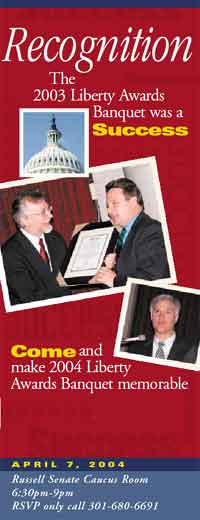Editorial - A Divine Imperative
Lincoln E. Steed March/April 2004
Getting your Trinity Audio player ready...

They brought Jesus before the Roman Governor in the great judgment hall early Friday morning. Before the end of that same day Jesus would be nailed to a cross and lifted up as a common criminal before a jeering mob and distraught followers.
But Governor Pilate did not yet see that conclusion to the day. He likely was more interested in discovering what it was about this Man that had provoked first the adulation of the crowds and then the betrayal by one of his own into the hands of the implacable.

The answer was quite plain, but in a context that disarmed the bureaucrat. "My kingdom is not of this world," answered the Christ. "If my kingdom were of this world, then would my servants fight....To this end was I born, and for this cause came I into the world, that I should bear witness unto the truth. Every one that is of the truth heareth my voice." John 18:36,37.
No threat there! Rather the proclamation of an alternate universe...another value system altogether.
"What is truth?" shot back the governor, professing not to know. He clearly knew what Jesus was talking about. It was enough for him to go out to the accusers and say "I find in him no fault at all". And it resonated with the philosophical discourse of the time that sought to divine the centrality of existence; to prioritize values. It cut through the legal, imperial values of Rome and spoke to the inner definitions it had always grappled with.
Pilate was moved. And then the system bit back. "You are not Caesar's friend if you let this man go".
So did Pilate let go of principle and embrace expediency.
But what is truth? Jesus used the term, no doubt, as shorthand for a knowledge of the divine. After all, he claimed to be "the way, the truth, and the life". Jesus took the concept out of the realm of the philosophical and made it a divine imperative.
In an earlier address, Jesus said that his followers could know the truth, "and the truth will set you free." As vassals of an overbearing occupying power they wanted freedom so badly they could taste it. Jesus simultaneously offered freedom to his followers and assurance to the questioning Roman that it was not a political freedom.
It seems to me we are in the same relationship to the state when we talk about religious freedom.
Religious freedom cannot be something that a state gives, since it is not of "that" world. It belongs to the world of the inner man; the bridge to the transcendent.
So much of the discussion of religious liberty in this part of the world centers around the Constitutional guarantees of religious liberty. Perhaps because of that we seem sometimes to conflate the two. But surely we dare not argue that religious freedom exists only under a U.S. type constitution! It might be one of the more enabling human instruments for the practice, or not, of any religion, but it is human and not the source of the religious liberty itself. Not even with the accompanying Bill of Rights acknowledgment of inherent (see created/God-given) rights.
And it is fine to call for democratic renewal around the world, under the assumption that religious freedom will naturally flow from that change. However, such a simplistic assumption may be misguided. Already the outlines of a new Afghan constitution show it seriously lacking in the religious freedom area; and it seems likely that the soon to be drafted Iraqi constitution will similarly play religious favorites and miss the point of the exercise. And there are many fine democracies still struggling to implement true religious freedom; it's a list that includes new democracies and some old ones like France (where "sects" are restricted and religious attire newly forbidden).
I see many approaches to religious liberty, even as some miss the point. There is the aforementioned Constitutional approach. And here the cast is curious. There are secularists, often opposed to religion, who use the Constitution as a tool to chase religion from public life. There are political religionists who seek to substitute legal mandate for an appeal to the heart. And there are people of faith who see security in maintaining the constitutional dynamic of a separation between church and state.
Some pursue religious liberty from a human rights point of view. Some promote religious liberty, hoping to gain particular advantage for their own faith. Others in an even more problematic approach, seek particularly to want to restrict faith activity that differs from their own. And there are others who accept the principle of religious liberty for all, but are prepared to give away that right to the state under any number of special circumstances; be it
security needs or conflict with public interest.
We mustn't allow religious liberty to become so esoteric that it can be clouded by a "What is truth," riposte. Religious liberty as we see it exercised has many aspects, even many mechanisms to enable it to function. What this magazine must proclaim is the transcendence of true religious liberty. It cannot be tied to any nation, system of governance, culture grouping or sectarian agenda. It comes from the one God, given with the gift of life: it is the gift that defines us as his creation and describes his way of interacting with his creatures. Who would dare define it otherwise? Anything less is just another human construct–subject to trial and error, vision and revision.
Lincoln E. Steed
Editor
Liberty Magazine


Article Author: Lincoln E. Steed
Lincoln E. Steed is the editor of Liberty magazine, a 200,000 circulation religious liberty journal which is distributed to political leaders, judiciary, lawyers and other thought leaders in North America. He is additionally the host of the weekly 3ABN television show "The Liberty Insider," and the radio program "Lifequest Liberty."